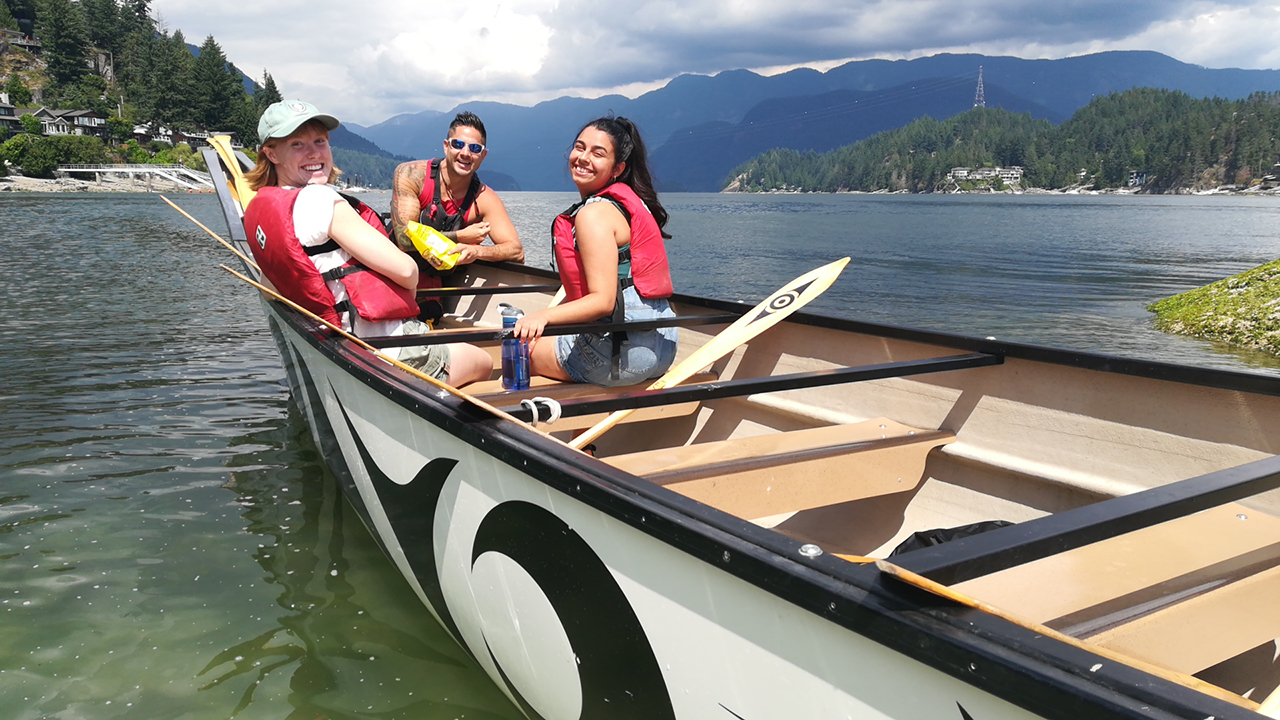Students Turn Film Focus to Water-Sensitive Futures Through a Local Lens

Posted on | Updated
Indigenous knowledge keepers and local experts help guide students through Metro Vancouver's aquatic ecology.
During a class offered this summer in association with the David Suzuki Foundation and the University of Cape Town’s Future Water Institute, seven Emily Carr University students were given the opportunity to create short films exploring four key Metro Vancouver waterways. Working in collaboration with Indigenous knowledge keepers and local experts from stewardship organizations, students were informed by ancestral histories of local ecological sites and ecosystem-based perspectives to create new narratives aimed at envisioning sustainable, water-sensitive futures.
The collaborative, intergenerational ethos of the films was inspired by late Mohawk/English poetess Pauline Johnson’s iconic collection of stories, Legends of Vancouver (1911), which documents stories of local lands and waters shared by her friend, the late Chief Joseph Capilano (Sa7plek) of the Squamish Nation.
The theme of the class was taking an interdisciplinary approach to the nexus between water and climate change, and students were tasked with making a site-specific video focused on one of four water bodies linked to the stories in Legends of Vancouver.
Third-year photography major Atanaz Khandan-Barani chose Deer Lake in Burnaby as the subject of her own film. With scenic picnic sites and gentle trails leading to a variety of arts venues within the surrounding urban park, Deer Lake is commonly associated with leisure and recreation — an impression that overlooks the site’s complex colonial history.
To help create her film, Atanaz was paired with freelance photographer, activist and streamkeeper John Preissl. By speaking with John, who is a descendent of Chief Capilano, Atanaz learned more about Deer Lake’s importance to Indigenous communities, and to John’s personal history.
Encompassed within the Central Valley Watershed, Deer Lake has served as a crucial ecological sanctuary for generations. To highlight the rich biodiversity of the lake’s flora and fauna, Atanaz decided to take a “Slow Media” approach and focus on specific details for prolonged stretches of time. Slow Media was introduced to the class by guest lecturer Gregory Coyes, who defines this approach as "decolonized media."
While Atanaz’s work typically involves shooting people rather than landscapes, the film project provided her with an opportunity to explore new approaches to making.
“I think everyone should try to work outside of their comfort zone a little bit,” Atanaz advises. “It creates new skills that I can take into my own practice.”
The entire class also participated in a guided cultural tour of the Burrard inlet by canoe. Led by Takaya Tours — an eco-tourism venture owned and operated by the Tsleil-Waututh Nation — the ocean tour provided the students another rich opportunity to learn about Tsleil-Waututh historical sites around Burrard Inlet, as well as Indigenous cultural practices and water stewardship.
One of the greatest takeaways for Atanaz was being able to participate in a project aimed at generating public awareness of the impacts of climate change on local waterways. She hopes her film will encourage a greater understanding of the importance of protecting natural heritage.
Coalescing under the title Living Legends of Vancouver, Atanaz and her cohort will be premiering their short films on Aug. 15 at the Beaty Biodiversity Museum as part “Nocturnal” —the museum’s unique after-hours programming series. The evening will also feature interactive presentations and a dialogue led by the artists.
“Expect a fun night with an open mind to change,” Atanaz says of Living Legends of Vancouver. “People can come expecting to learn.”
--
By Kiel Torres